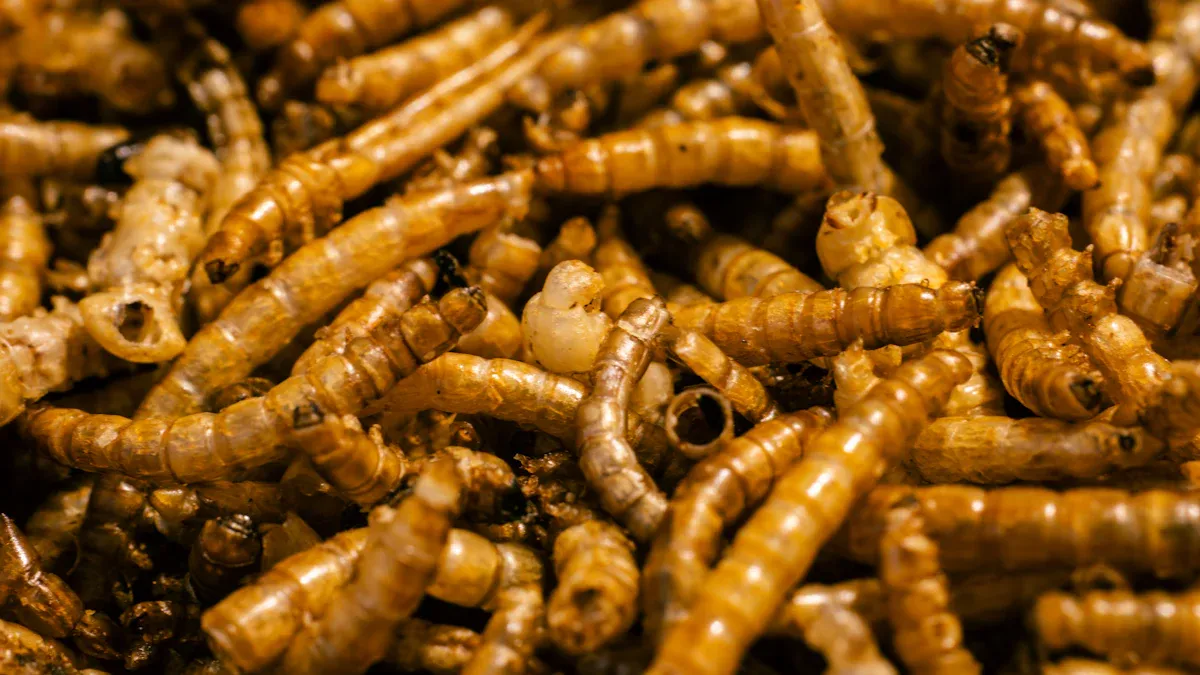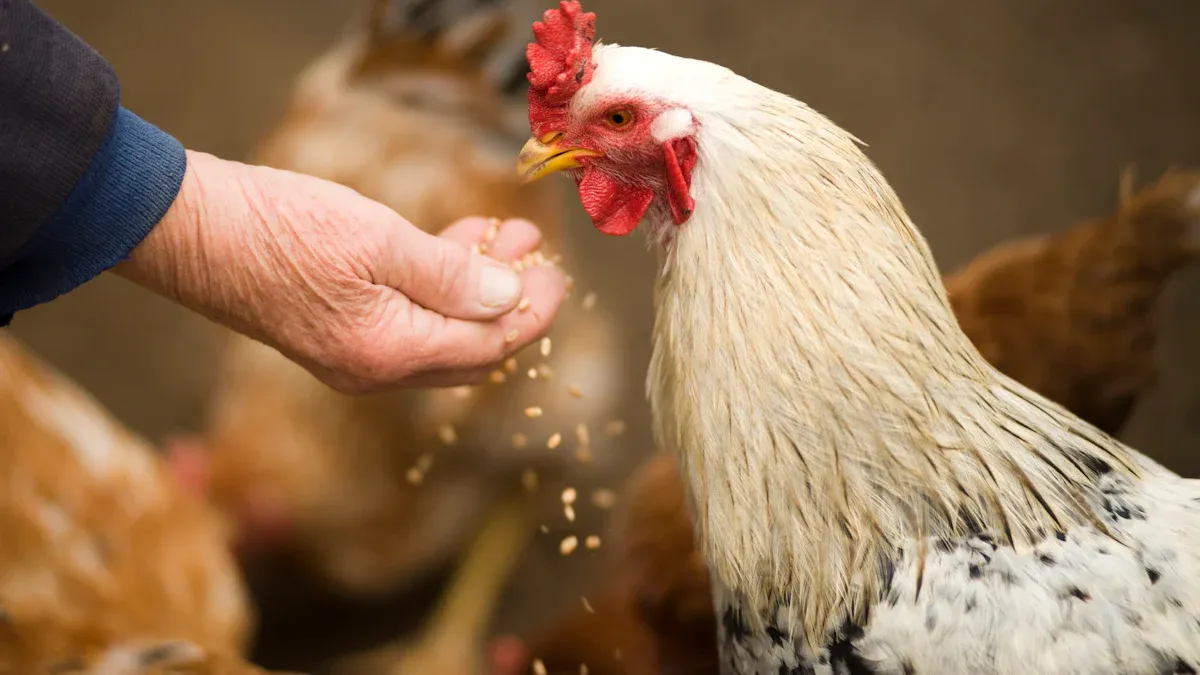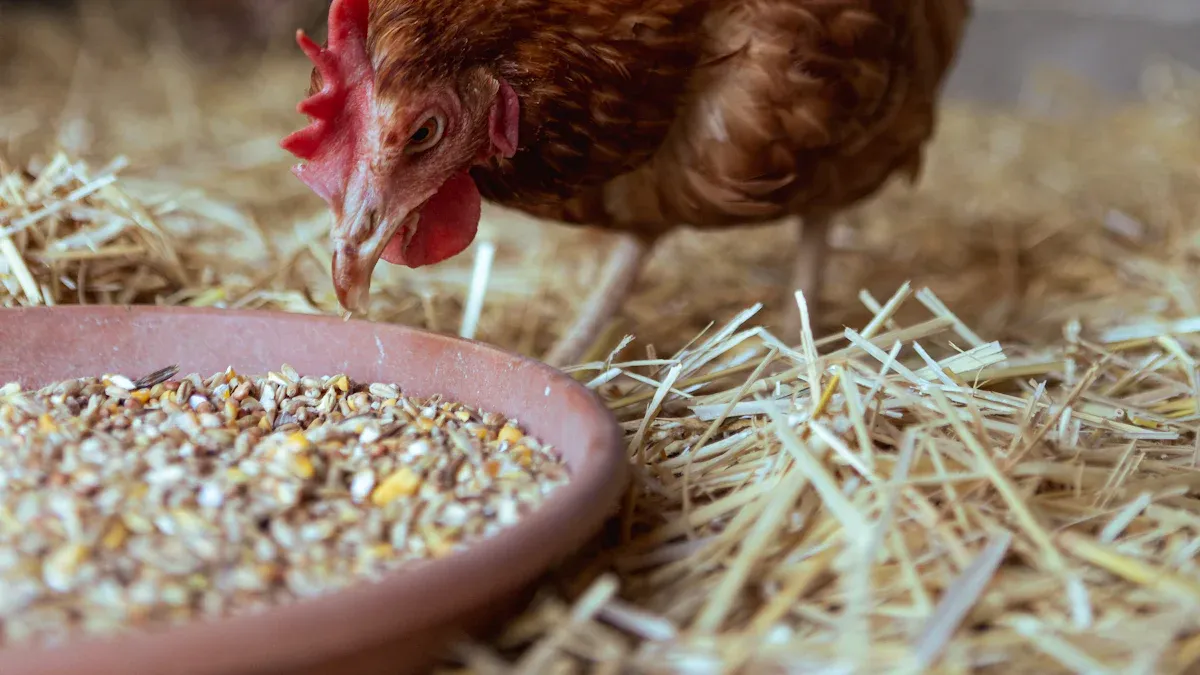
Dried mealworms for poultry are a game-changer in animal nutrition. Packed with 13.68 to 22.32 grams of protein per 100 grams, they deliver more protein than many traditional feeds. They also provide essential nutrients like zinc, magnesium, and vitamin B12, which support growth and health. These natural, nutrient-rich treats improve poultry productivity without relying on artificial additives or hormones.
Key Takeaways
- Dried mealworms give birds protein, which helps them grow strong. This makes birds healthier and more energetic.
- Adding mealworms to bird feed improves eggs. Eggs become bigger, better, and are laid more often, helping farmers.
- Mealworms make birds healthier by strengthening their immune system and lowering stress. This creates a happier and more productive flock.
Nutritional Benefits of Dried Mealworms for Poultry

High Protein Content for Growth and Energy
Protein is the building block of life, and poultry thrives on it. Dried mealworms for poultry are an exceptional source of protein, with Austrian mealworms boasting a protein content of 53.78% on a dry matter basis. This high-quality protein supports muscle development and provides the energy birds need to stay active and healthy.
Mealworm protein is comparable to broiler protein, with a Protein Digestibility-Corrected Amino Acid Score (PDCAAS) of 0.86. This means poultry can efficiently absorb and utilize the protein for growth and energy. Plus, mealworms require less feed to produce the same amount of protein compared to traditional livestock, making them a sustainable choice for farmers.
Essential Vitamins and Minerals for Vitality
Dried mealworms for poultry are packed with essential vitamins and minerals that promote vitality. They contain B vitamins, vitamin E, and selenium, all of which are crucial for maintaining avian health. These nutrients enhance muscle development, improve egg production, and support the immune system.
Research shows that protein-rich diets, like those including mealworms, lead to better laying performance. Chickens fed dried mealworms produce eggs with stronger shells and higher nutritional value. Additionally, mealworms provide zinc and magnesium, which boost immunity and overall vitality in poultry.
Tip: Adding dried mealworms to your poultry’s diet can result in healthier, more productive birds.
Natural and Additive-Free Feed
One of the standout features of dried mealworms for poultry is their natural origin. Unlike conventional feeds that may contain artificial additives or hormones, mealworms are a clean, additive-free option. This ensures that poultry receives pure, nutrient-rich food without unnecessary chemicals.
Comparative studies highlight the benefits of mealworms over traditional feeds. For instance:
| Aspect | Mealworms | Conventional Feeds |
|---|---|---|
| Protein Content | High | Varies (generally lower) |
| Essential Amino Acids | Complete profile | Often incomplete |
| Environmental Impact | Lower greenhouse gas emissions | Higher emissions |
| Water Footprint | 4341 m3/t | Higher than mealworms |
Mealworms not only provide superior nutrition but also have a lower environmental impact. By choosing mealworms, farmers can support their poultry’s health while contributing to a more sustainable future.
How Dried Mealworms Improve Egg Production

Better Egg Quality and Shell Strength
Egg quality is a top priority for poultry farmers, and dried mealworms can make a big difference. These nutrient-packed treats provide the protein and moisture that chickens need to produce stronger eggshells. A diet that includes mealworms often results in eggs with richer yolks and deeper coloration.
- Adding mealworms to poultry feed enhances egg quality.
- The protein content in mealworms strengthens eggshells, reducing breakage.
- Chickens fed mealworms lay eggs with vibrant, nutrient-rich yolks.
Farmers who use dried mealworms for poultry often notice fewer cracked eggs and healthier hens. This simple addition to their diet can lead to better results in both quality and quantity.
Increased Egg Size and Nutritional Value
Bigger eggs with higher nutritional value are another benefit of feeding mealworms to poultry. The high protein content in mealworms supports muscle development and overall health, which directly impacts egg production. Essential nutrients like zinc and vitamin B12 also contribute to the nutritional richness of the eggs.
Chickens that consume mealworms tend to lay larger eggs with more robust yolks. These eggs are not only visually appealing but also packed with essential nutrients that benefit consumers. By incorporating mealworms into their diet, farmers can ensure their poultry produces eggs that stand out in both size and quality.
Enhanced Laying Frequency
Dried mealworms for poultry don’t just improve egg quality—they also boost laying frequency. With over 51% protein and a wealth of essential nutrients, mealworms provide the energy and health support that chickens need to lay eggs more consistently.
- Mealworms encourage natural foraging behavior, which keeps chickens active and stress-free.
- A diet rich in mealworms improves overall well-being, leading to increased egg production.
- Healthier chickens with better feather quality are more likely to lay eggs regularly.
Farmers who include mealworms in their poultry feed often see a noticeable increase in egg production. This makes mealworms a valuable addition to any poultry diet, improving both productivity and profitability.
Supporting Overall Health with Dried Mealworms
Boosting Immune System Function
A strong immune system is vital for poultry to thrive. Dried mealworms for poultry provide essential nutrients that naturally enhance their immunity. Packed with high-quality protein, amino acids, and vitamins, mealworms help chickens fend off diseases and maintain overall vitality.
Research highlights the immune-boosting properties of mealworms. For instance, their chitin content reduces harmful bacteria like E. coli and Salmonella while increasing beneficial gut bacteria such as Lactobacillus spp. This improves gut health, which is closely linked to a stronger immune response. Farmers who include mealworms in their poultry feed often notice healthier, more resilient birds.
Reducing Stress and Promoting Calmness
Stress can negatively impact poultry productivity. Dried mealworms encourage natural foraging behavior, which keeps chickens active and engaged. This reduces stress levels and promotes calmness within the flock.
Mealworms also provide a rich source of energy, helping birds stay active without feeling fatigued. A well-fed, stress-free chicken is more likely to lay eggs consistently and maintain good health. By incorporating mealworms into their diet, farmers can create a more harmonious environment for their poultry.
Improving Feather Quality and Appearance
Feather quality is a clear indicator of a bird’s health. Dried mealworms are especially beneficial during molting periods, as they supply the protein needed for new feather growth. This ensures that chickens maintain a vibrant and healthy appearance.
Studies show that mealworms improve feather quality and overall condition in poultry. Birds fed with mealworms often display shinier, stronger feathers, which protect them from environmental stressors. A healthy coat of feathers also boosts their confidence and activity levels, contributing to their overall well-being.
Tip: Adding dried mealworms to your poultry’s diet can lead to healthier, happier birds with improved productivity.
Dried mealworms offer three incredible benefits for poultry:
- Superior nutrition that supports growth and energy.
- Improved egg production with better quality, size, and frequency.
- Enhanced overall health, including stronger immunity and better feather quality.
Adding dried mealworms to poultry feed is a simple way to boost productivity and well-being. Try it today and see the difference in your flock!
Author: Felix
FAQ
What makes dried mealworms better than traditional poultry feed?
Dried mealworms offer higher protein, essential nutrients, and no artificial additives. They improve poultry health, egg production, and sustainability compared to conventional feeds.
How often should dried mealworms be fed to poultry?
Farmers can feed mealworms as a daily supplement or treat. A handful per bird ensures balanced nutrition without overfeeding.
Are dried mealworms suitable for all types of poultry?
Yes! Chickens, ducks, and turkeys benefit from mealworms. Their natural nutrients support growth, egg-laying, and overall health across various poultry species.
Tip: Gradually introduce mealworms into your flock’s diet to ensure they adapt comfortably.


